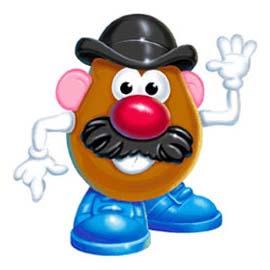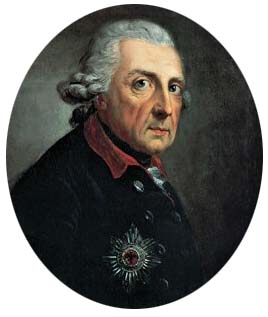|
The Best Marketing Secret I Ever Learned!
home |
more trade show marketing articles

While there's a lot that goes into successful marketing, and generally different
types of marketing (i.e. trade show marketing, direct marketing, internet
marketing, etc) can have different requirements, there are a few universal
truths and lessons that apply to almost all marketing. And one of those basics
truths that is often overlooked or is even just not understood or known, can
best be explained in the story of how a King marketed a new product.
Very few products sell themselves, and if they did, they wouldn't need
marketing. Most products need a bit of marketing to help them sell. Just to be
clear, I'm not talking about junky, useless products that are sold on late-night
infomercials, and I'm not talking about selling stuff that doesn't work or that
people don't need. I am talking about selling a good product that people may not
be familiar with or that they may not know much about. The secret to marketing a
good product is found in the history of the potato, and how a King helped
"sell" it to a skeptical public.
Everyone knows about the potato today, and knows it's probably one of the most
popular foods in America... french fries, potato chips, baked potatoes, hash
browns, tator tots... but believe it or not, the potato hasn't always popular.
Once upon a time, it had to be marketed, and it was a King who came up with the
Best Marketing Secret Ever!
The potato did not originate in Idaho, but instead came from South America, and
was a staple food source for the Incas. The Spanish Conquistadors brought it
back from the New World and introduced it to Europe. Unfortunately, McDonalds
wasn't around at the time, and the potato flopped with the masses. People just
couldn't get used to the idea of digging in the dirt (and manure, worms, and
worse) for their dinner. Eating something like a potato just wasn't going to
happen. People generally considered the potato to be unfit for human
consumption. It was considered by many to be poisonous, and was blamed for
leprosy and syphilis, as well as early death, sterility, and rampant sexuality.
The potato was even said to ruin any soil in which it was planted. One French
town banned it's cultivation on pain of death. The strange tuber was rumored to
have come from a heathen civilization and was likely the product of the devil!
 However,
Frederick the Great (Frederick II, 1712-1786), King of Prussia (now Germany),
realized the potential value of this new fangled tuber as a good and reliable
food source. Europe at this time was regularly being overrun by competing
armies, who often plundered what food was available and burned the crops they
couldn't take. The great thing about a field of potatoes though was while a
marauding army would destroy wheat fields and vineyards, they weren't going to
spend their time digging up potatoes. Thus a field of potatoes would survive.
King Frederick wanted his people to start widely growing and eating potatoes, but his
people didn't want to grow or eat them. Apparently the fact that potatoes are
one of the best food sources out there was not known or appreciated. Common folk
then did not know that potatoes are rich in vitamin C and potassium, are an
excellent source of fiber, and actually by themselves supply every essential
nutrient except calcium, vitamin A and vitamin D. They didn't realize that
potatoes are an easy-to-grow plant that can provide more nutritious food faster
on less land than any other food crop, and in just about any habitat. No, the common
man did not know all the benefits of the great potato. People just saw potatoes
as a tasteless evil root-thing in the dirt. However,
Frederick the Great (Frederick II, 1712-1786), King of Prussia (now Germany),
realized the potential value of this new fangled tuber as a good and reliable
food source. Europe at this time was regularly being overrun by competing
armies, who often plundered what food was available and burned the crops they
couldn't take. The great thing about a field of potatoes though was while a
marauding army would destroy wheat fields and vineyards, they weren't going to
spend their time digging up potatoes. Thus a field of potatoes would survive.
King Frederick wanted his people to start widely growing and eating potatoes, but his
people didn't want to grow or eat them. Apparently the fact that potatoes are
one of the best food sources out there was not known or appreciated. Common folk
then did not know that potatoes are rich in vitamin C and potassium, are an
excellent source of fiber, and actually by themselves supply every essential
nutrient except calcium, vitamin A and vitamin D. They didn't realize that
potatoes are an easy-to-grow plant that can provide more nutritious food faster
on less land than any other food crop, and in just about any habitat. No, the common
man did not know all the benefits of the great potato. People just saw potatoes
as a tasteless evil root-thing in the dirt.
Frederick the Great is known for his military genius, but what is overlooked is
his marketing genius. Frederick the Great foresaw how valuable the widespread
cultivation and use of the potato for a food source would be. He could have passed laws and edicts demanding that his
people grow and eat potatoes, but he realized this was not the best way to
accomplish his goal (have you ever commanded your kids to eat their broccoli?).
Instead of mandating potato growing and eating, Frederick the Great, marketing
genius (and historically underappreciated potato marketeer extraordinaire), ordered that a section of his royal grounds be planted with potatoes,
and then post heavily armed guards around the field to protect it. When the
locals saw the fields being guarded, they wondered what valuable, wonderful,
royal crop was being grown. They figured that anything worth guarding was also
worth stealing. Frederick had predicted this, and had instructed his armed
guards to look the other way, and to allow the locals to sneak in and steal a
few of these "valuable" (potato) plants. Well, the locals stole them, and
started growing and eating the "royal" food themselves.
Frederick the Great used a bit of
reverse psychology to create a sense of value and desire. He made his people
want the potato! And we all know how well the potato has done since then.
So the secret behind this potato marketing history lesson is to understand the
value of creating desire. Make people want, value, and desire your product. When you're
planning your next trade show marketing
campaign, remember Frederick the Great, spud marketing genius,
and remember the potato!
PS. Several years ago, I read an article about how Frederick the Great planted
royal potatoes and then "guarded" them to create a sense of value and desire for
the then extremely unpopular food among his people, and the story and its lesson
has always stuck with me. Unfortunately when I recently tried to find the source
I couldn't. But I did find two other conflicting references to the royal potato
marketing story. One source credited Frederick the Great as I expected, but the
other source told essentially the same story but said if was Louis XVI
(1754–1793), King of France, who planted the potato on his royal grounds and
then "guarded" the field. So I don't know whether one should
really give credit for this clever potato marketing lesson to the Germans or the French. But
because the Germans can still sell their cars (when Japanese cars are an option)
and because the French can still sell their wines (when California wines are an
option) I would say it could have been either Frederick the Great or Louis XVI.
You pick. The important thing is to remember the importance of cultivating and
creating a desire for your product, which to my mind, is the best marketing
secret I ever learned.
* * * * *
more trade show marketing articles
Institute
for Trade Show
Marketing Excellence | ITSME
http://www.TradeShowMarketingAdvice.org
copyright 2004-2015 all rights reserved
|